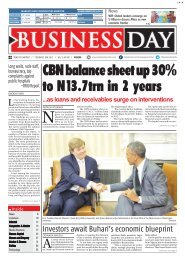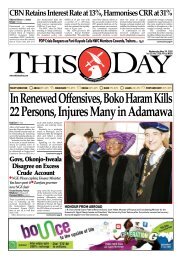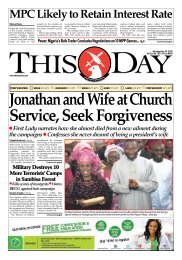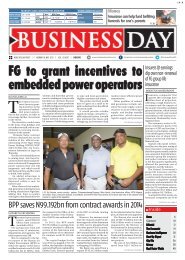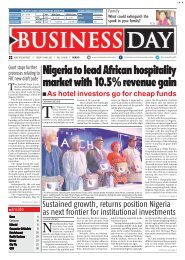Create successful ePaper yourself
Turn your PDF publications into a flip-book with our unique Google optimized e-Paper software.
40 THE NATION TUESDAY, APRIL 28, 2015<br />
LAW REPORT<br />
IN THE SUPREME COURT OF NIGERIA<br />
HOLDEN AT ABUJA<br />
ON FRIDAY THE 17 TH DAY OF APRIL, 2015<br />
BEFORE THEIR LORDSHIPS<br />
MAHMUD MOHAMMED, J.S.C.<br />
JOHN AFOLABI FABIYI, J.S.C.<br />
SULEIMAN GALADIMA, J.S.C.<br />
OLABODE RHODES-VIVOUR, J.S.C.<br />
MUSA DATTIJO MUHAMMAD, J.S.C.<br />
CLARA BATA OGUNBIYI, J.S.C.<br />
KUDIRAT MOTONMORI OLATOKUNBO KEKERE-EKUN, J.S.C.<br />
SC.643/2014(REASONS)<br />
(2015) LPELR-24588(SC)<br />
Only a party’s leadership can<br />
determine existence or proof of division<br />
BETWEEN:<br />
HON. IFEDAYO SUNDAY AGBEGUNDE ————————————— APPELLANT<br />
AND<br />
THE ONDO STATE HOUSE OF ASSEMBLY & ORS —————- RESPONDENTS<br />
LEAD JUDGMENT DELIVERED BY MUSA DATTIJO MUHAMMAD, J.S.C.<br />
On 19th March, 2015, having found the appeal and the cross-appeal to which this judgment<br />
relates unmeritorious, the Court dismissed the two and promised to give the reasons. The<br />
reasons are provided anon.<br />
THE appellant contested and won the<br />
Akure North/South Federal constituency<br />
seat on the platform of the Labour Party.<br />
He abandoned the party and defected to the<br />
Action Congress of Nigeria (ACN). He asserts<br />
that the factionalization or division in the Ondo<br />
State Chapter of the Labour Party accounts for<br />
his defection to the Action Congress of Nigeria.<br />
By an originating summons filed on the 26 th<br />
January, 2012, the Appellant as Plaintiff<br />
commenced Suit No. FHC/AK/CS/31/2012 at<br />
the Federal High Court, hereinafter referred to<br />
as the trial Court, seeking the interpretation of<br />
Section 68(1) (a) and (g) of the 1999 Constitution<br />
as amended and a declaration thereon that by<br />
virtue of the proviso to the Section he is<br />
entitled to remain the elected member for<br />
Akure North/South Federal constituency<br />
inspite of his defection from the Labour Party<br />
that sponsored him to the Action Congress of<br />
Nigeria, (ACN). Appellant also urges that the<br />
Defendants, the Respondents herein, be<br />
restrained from howsoever tampering with<br />
his right to the Federal seat.<br />
STAKEHOLDERS have called for laws to<br />
regulate the importation of used Euro<br />
pean cars, which have reached the end<br />
of their lives.<br />
A former Lagos State Attorney-General, Mr<br />
Olasupo Shasore (SAN) said such laws should<br />
set a limit to the age of vehicles brought into<br />
the country.<br />
He spoke in an interview with reporters at<br />
a colloquium in Lagos to mark the 2015 Earth<br />
Day, organised by the Kuramo Conferences<br />
and the Resource Innovation and Solutions<br />
Network Nigeria (RISSN), initiators of the<br />
Sustainability School Lagos. The theme was:<br />
Solutions for a sustainable future.<br />
A German chemist and toxologist, Dr.<br />
Beate Kummer said Nigeria had become a<br />
dumping ground for “end-of-life” vehicles<br />
The 1st - 3rd Respondents not only contested<br />
Appellant’s claim, they counter-claimed<br />
against him. They assert that by virtue of the<br />
very proviso to Section 68(1) (g) of the 1999<br />
Constitution as amended, the Appellant who,<br />
on the basis of the factionalization or division<br />
in the Ondo State Chapter of the Labour Party<br />
alone, defected to the Action Congress of<br />
Nigeria, automatically ceases to be the elected<br />
member for the Akure North/South<br />
Constituency. It was Defendants’ prayers that<br />
the seat be declared vacant and the<br />
Independent National Electoral Commission<br />
ordered to conduct a bye election for the vacant<br />
seat. Appellant’s claim as contained in his<br />
originating summons and the 1st - 3rd<br />
Respondents’ counter-claim were taken<br />
together. The trial Court in a considered<br />
judgment while dismissing Appellant’s claim<br />
granted the 1st - 3rd Respondents’ counterclaim.<br />
Dissatisfied with the trial Court’s<br />
decision, the Appellant appealed to the Court<br />
of Appeal, Akure Division, hereinafter<br />
referred to as the Court below. The Court in a<br />
•From left: Dr Olarewaju, Dr Nwagwu, Mr Oresanya, Ms. Freyer, Dr Kummer and Shasore<br />
By Joseph Jibueze<br />
meant for recycling in Europe.<br />
She said about 300,000 of such cars were<br />
pushed into Nigeria in 2012, adding: “Nigeria<br />
is a huge market for end-of-life vehicles,<br />
which are sold for dumping prices. These<br />
vehicles are often smuggled from Europe or<br />
North America through over 1,400 illegal<br />
routes.”<br />
Shashore said Nigeria can stop being a<br />
dumping ground for such rejected items<br />
through the enactment of relevant laws and<br />
proper regulation.<br />
“We have learned that there is an end-oflife<br />
designation for European cars. We don’t<br />
have legislation that creates a cut-off period<br />
for the end-of-life of a vehicle, the point at<br />
which a vehicle must be recycled.<br />
well considered judgment dismissed the<br />
appeal decision and affirmed the trial Court’s<br />
decision. Still aggrieved, the Appellant<br />
appealed to the Supreme Court. The 5th and<br />
7th Respondents also cross-appealed against<br />
the Lower Court’s judgment. The sole issue<br />
distilled by the Appellant in his brief of<br />
argument which the Respondents to the appeal,<br />
except the 5th and 7th, seem to adopt as having<br />
arisen for the determination of the appeal,<br />
reads:-<br />
“Whether the Lower Court’s interpretation<br />
and application of Sections 68(1) (a) (g) and<br />
222(a) (e) and (f) of the Constitution of<br />
Federal Republic of Nigeria 1999 (as amended)<br />
is valid, when it affirmed the trial Court’s<br />
decision, that a dispute at the state level does<br />
not warrant the Appellant’s defection and<br />
consequently arrived at the conclusion that<br />
the National leadership of a political party<br />
determine the existence or proof of division<br />
in a political party.”<br />
On their sole issue, learned Appellant’s<br />
counsel contended that the trial Court’s<br />
interpretation of Section 68(1) (a) and (e) of<br />
the 1999 Constitution and the Lower Court’s<br />
affirmation of same are wrong in law. The<br />
position of the two Courts that it is only a<br />
dispute or crisis which consumes the national<br />
leadership of a political party that entitles the<br />
Appellant who had defected from the party<br />
that sponsored him because of the crisis to<br />
retain his seat, is not what Section 68(1) (a)<br />
and (g) of the 1999 Constitution envisages. A<br />
political party, it was contended, exists at<br />
various levels, to wit, ward, local government,<br />
state and national levels. Crisis at any of these<br />
levels, not necessarily at the national level of<br />
the party alone, submitted learned Appellant<br />
counsel, fits the division Section 68(1) (a) (g)<br />
contemplates as justifying a defection from<br />
the political party that sponsored the defector<br />
as well as the retention by the defector of his<br />
seat. The Appellant, it was further submitted,<br />
was justified to retain his seat having<br />
abandoned the Labour Party that sponsored<br />
him because the state chapter of the party is<br />
factionalized and divided. Further arguing the<br />
issue, learned counsel contended that the rules<br />
of statutory interpretation require the two<br />
Courts to ascribe to the words that make up<br />
Section 68(1) (a) and (e) they are asked to<br />
interprete their ordinary literal meaning<br />
without more. Section 222(a) and (f) of the<br />
Constitution which the Courts relied upon to<br />
“We don’t have legislation that can designate<br />
use of batteries, telephones and our inverters<br />
at home. They become hazardous and<br />
harmful when they are not disposed of properly.<br />
It affects the soil and the water, and<br />
drinking it can lead to cancer.<br />
“If we have the knowledge as legal practitioners,<br />
we can lobby for a framework to be<br />
created. That is a lacuna in our laws right<br />
now. All we do is find ways in which we<br />
discourage it hopefully by increasing the<br />
importation duty.<br />
“Some of these vehicles have reached the<br />
end of their lives in the countries of their<br />
importation. There is no framework.<br />
“We hope that will be one of the points<br />
that should make the agenda of this colloquium,”<br />
Shasore said.<br />
interprete Section 68(1) (a) and (g) only outlines<br />
conditions for the eligibility of an association<br />
to operate as a political party in Nigeria. It<br />
does not, as wrongly held by the Courts, in<br />
any way help in defining the type of division<br />
provided under Section 68(1) (a) and (e). By<br />
erroneously imputing the word “faction” at<br />
the national level of the political party and<br />
cross-referencing the word into Section 222 of<br />
the 1999 Constitution, the Courts stand liable<br />
for reading into the Constitution what the<br />
legislature does not intend. Further relying<br />
on Imah V. Okogbe (1993) 9 NWLR (Pt.316)<br />
159 at 173; (1993) LPELR-1497(SC), AG<br />
Federation V. AG Lagos State (2013) 16 NWLR<br />
(Pt 1380) 249 at 317; LPELR-SC.340/2010 and<br />
Agwuna V. AG Federation (1995) LPELR -258<br />
(SC), learned counsel urged that the Lower<br />
Court’s circumscribed statutory interpretation<br />
rather than the liberal one be discountenanced.<br />
Concluding, learned counsel submitted that<br />
the Lower Court’s wrong resort to the<br />
decisions of the Court in Fedeco V. Goni<br />
(1983) LPELR-1256 (SC) and Abubakar V. AG<br />
Federation (2007) 10 NWLR (Pt 1041) 178;<br />
LPELR-SC.7/2007 does not save its judgment.<br />
Learned counsel urged that the issue be<br />
resolved in their favour and the appeal<br />
allowed.<br />
Responding, learned counsel to the 1st - 3 rd<br />
Respondents submitted that the facts on the<br />
basis of which the Appellant sought his reliefs<br />
and the 1st - 3rd Respondents counter-claimed<br />
against him are not in dispute. The resolution<br />
of the dispute created by the facts, learned<br />
counsel submitted, requires the communal<br />
interpretation and application of Sections<br />
68(1)(g), 221, 222(a)(e) and (f) and 229 of the<br />
1999 Constitution (as amended). The Lower<br />
Court in determining whether and how the<br />
meaning of these Sections relate to these<br />
ascertained facts, learned counsel further<br />
submitted, must be guided by certain rules.<br />
Basic among these rules, it was submitted, is<br />
the duty on the Court to consider the<br />
Constitution from which the particular<br />
sections emanate as a whole and ascribe to the<br />
clear and unambiguous words which make<br />
up the Sections their ordinary literal meaning.<br />
The two Courts have dutifully applied the<br />
relevant principles correctly and rightly<br />
concluded that the type of division envisaged<br />
under Section 68(1) (e) of the Constitution is<br />
one that affects the entire structure of the<br />
political party.<br />
•To be continued next week<br />
Stakeholders seek<br />
laws to regulate used<br />
car importation<br />
RISSN Director Dr Olufemi Olarewaju<br />
called for the strengthening of the legal<br />
framework to reduce the import of rejected<br />
vehicles and other expired and harmful appliances<br />
into Nigeria.<br />
“Advocacy is what we need to be a part of.<br />
We’ll be doing a lot of engagements,” he told<br />
reporters. First of all we don’t even know<br />
what the legal framework is. In terms of abandoned<br />
vehicles for instance, why should a<br />
car that is condemned somewhere in the<br />
world be able to come into Nigeria freely?<br />
“In our situation most of the time the laws<br />
are in the books. We just have challenges in<br />
enforcing them. The legal framework is significant<br />
because it is based on it that the private<br />
sector can operate; they need to obey<br />
the laws of the land. It’s a critical component<br />
of what we need to achieve going forward.”<br />
Managing Director of the Lagos Waste<br />
Management Agency (LAWMA) Mr Ola<br />
Oresanya believes having a strong database<br />
of what is imported would help in regulation.<br />
He, however, argued that what is considered<br />
old or useless in one country may not<br />
been seen as such another, saying: “What is<br />
‘end-of-life’ in Europe may not be ‘end-oflife’<br />
here. You define what is ‘end-of-life’.<br />
It’s a relative word really; it’s not absolute.”<br />
Among the guests were Dr Babatunde<br />
Ajibade (SAN), former Civil Liberties Organisation<br />
(CLO) president, Mrs Ayo Obe;<br />
environmentalist Newton Jibunoh; Country<br />
Director, Africare Nigeria Dr Orode Doherty;<br />
Manager, First Bank Sustainability Centre,<br />
Lagos Business School Dr. Ijeoma Nwagwu;<br />
ms. Baerbel Freyer of the German Industry<br />
and Commerce in Nigeria, among others.



